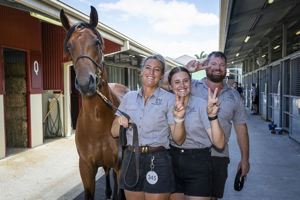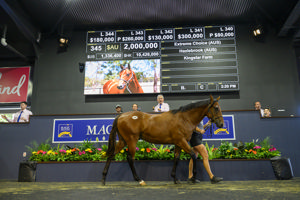In my many years of dealing with clients with breeding and racing properties, it has been very common to consult to them on the tax implications where there is a full or partial sale of the property for subdivision purposes.

There are many reasons why these holdings are sold, however the main reasons are that the land holding has grown superfluous to their needs, or the client has decided to exit the industry and no longer needs the property and the holding costs that come with it.
If the property is subject to capital gains tax (i.e. it was acquired on or after 20 September 1985), many industry clients who are not in the business of property development incorrectly believe that any proceeds received from selling their property will always be a mere realisation of an asset on capital account (i.e. subject to capital gains tax) , no matter how much the property has been developed, and regardless of their intention in relation to the property.
Unfortunately, this is not always correct, as the sale of the property may, in some cases, be part of a profit-making scheme. If sold under a profit-making scheme, the tax outcome is usually far worse, and the calculation is complex and costly.
From a tax perspective, there are significant advantages where the sale of a property represents the mere realisation of a capital asset, as referred to above, and the profit on the sale is dealt with solely under the CGT rules (i.e., as a capital gain).
For example:
- a taxpayer may be able to disregard a capital gain on their main residence
- a business taxpayer may be eligible for the CGT small business concessions on the sale of business premises
- Capital gains may also be reduced by up to 50% (under the CGT general discount) if they relate to a property acquired by the taxpayer at least 12 months before being sold
This article will focus on a taxpayer whose 10-acre farm was developed and subdivided into 48 residential lots and 2 commercial lots who successfully argued before the Federal Court (Morton v Commissioner of Taxation [2025] FCA 336) that the proceeds from the sales of those lots were capital receipts derived on the realisation of a pre-CGT asset.
By having the sale categorised as being on “capital account” (a capital
asset), the taxpayer could then crucially argue that the proceeds were exempt
from tax as the property was acquired before the CGT start date of 20
September 1985.
- Facts
The taxpayer was a retired farmer who had owned a 10-acre parcel of land
(known as “Dave’s Block”) in Tarneit, West Melbourne. For many years the
taxpayer, like his father before him, had farmed Dave’s Block and adjoining
land as one property (collectively referred to as “Morton Farm”). Dave’s Block
had been subdivided from Morton Farm in 1973 and sold to the taxpayer
in 1980 (pre-CGT) for $13,500 by the taxpayer’s father. Surrounding blocks
had been transferred to the taxpayer and his brother as trustees of their
respective family trusts.
In 2010 the land was rezoned as residential land. In addition to increasing the value of the land, the rezoning also resulted in increased rates and land tax that affected the profitability of the farm, which had become harder to manage due to urban encroachment. Over the following years, the taxpayer and his family entered into development agreements with a property development group (Dacland) for Morton Farm to be developed, subdivided and sold as individual allotments in a housing estate.
Three agreements were entered into in 2012, with Dave’s Block the subject of an agreement entered into by the taxpayer and Tarneit East (a Dacland company) on 23 November 2012. That agreement included clauses to the effect that the owner wished to maximise the sale proceeds from the land and the developer would undertake the development works (which included all works, services, undertakings and conduct required to complete the development, including all compliance obligations, infrastructure, and marketing). This is nothing unusual for a developer to do.
The development of Morton Farm was divided into 31 stages. Ultimately Dave’s Block (stage 15) was subdivided into 48 residential lots and 2 commercial lots. Settlement on the residential lots occurred in February and March 2019. Settlement on the commercial lots occurred on 19 October 2020 and 2 July 2021 respectively. The ATO issued amended assessments to the taxpayer for the 2019 and 2021 tax years, bringing the proceeds from the sales of the allotments on Dave’s Block into account as assessable income, i.e., a profit-making scheme. When the taxpayer’s objections to the assessments were disallowed, he appealed to the Federal Court.
In essence, the taxpayer’s claim was that the proceeds from the sales of the allotments that comprised Dave’s Block were capital receipts derived on the realisation of a pre-CGT asset, and therefore not assessable as income. He claimed that the development, subdivision and sale of Dave’s Block constituted no more than an enterprising means of achieving the best price when realising his capital asset. To the contrary, if the proceeds of the sales were assessable as income, he argued that the value of Dave’s Block used to calculate his assessable income in the amended assessments was incorrect as any land that became trading stock did so on a date much later (i.e. in 2019 when the land was subdivided) than the 2012 date assumed by the Commissioner.
2. Profit-making factors
For the court to decide that the taxpayer sold these holdings as part of a profit-making scheme, and thus considered to be assessable income, some of the factors which may be relevant in determining whether a property transaction amounts to a commercial “profit-making” transaction broadly include the following (note that this is not an exhaustive list).
- The amount of money involved in the transaction, and the magnitude of the profit sought or obtained. The higher these amounts, the more likely it is that the transaction is commercial.
- The nature, scale and complexity of the transaction. A large-scale and complex transaction is more likely to be commercial than a small-scale and straightforward transaction.
- The nature and scale of other activities undertaken by the taxpayer. For example, if the taxpayer carries on property development through other entities, then the transaction is more likely to be commercial.
- The taxpayer’s purpose or intention in acquiring, and disposing of, the property. For example, inherited land that is subdivided and sold is less likely to amount to a commercial transaction, compared to land that is specifically acquired by the taxpayer for this purpose.
- The taxpayer’s personal involvement in the transaction. The more extensive the taxpayer’s personal involvement (e.g., in the development planning process, etc.), the more likely it is that the transaction is commercial.
The ATO contended that the amounts in issue were assessable on 2 bases. The first was that, in developing, subdividing and selling the land, the taxpayer carried on a business (very contentious), and therefore Dave’s Block was trading stock and the amounts in issue were income according to ordinary concepts. Alternatively, the amounts in issue were assessable as statutory income on the ground that the amounts were profit arising from the carrying on or carrying out of a profit-making undertaking or plan.
- Decision
The Federal Court allowed the taxpayer’s appeal, finding that no part of the proceeds of the sale of Dave’s Block was assessable income in the taxpayer’s hands. Thus, the sale amounts were treated as capital proceeds.
Contrary to the ATO’s submissions, the court considered that the taxpayer did not pursue a course of conduct calculated to achieve the maximum available proceeds for Dave’s Block, or the Morton Farm more generally, at any cost. Instead, he adhered to his 2 “tenets”, which precluded the land from being used as security for finance and which provided for the Morton’s to obtain a fixed percentage of the sale proceeds of subdivided lots. He was not willing to bet the farm on the commercial success of Dacland’s development. He continued to farm Dave’s Block up to about 2015 and played little active role in its development.
According to the court, the scale of the subdivision and sale of the Morton Farm was a product of the size and nature of the Morton Farm as an asset, in combination with forces prevailing in the market for residential property in Tarneit over the relevant period. The acreage or the number of lots involved alone did not indicate the taxpayer was engaged in a business of land subdivision and development.
Furthermore, the taxpayer’s activities were not marked by repetition in the relevant sense. The court said that the absence of repetition was a significant factor telling against a conclusion that the sale proceeds of Dave’s Block were assessable income. The arrangements between the taxpayer and Dacland — including arrangements as to agency and powers of attorney — did not alter that position. Dacland’s business-like conduct did not colour the nature of the taxpayer’s activities, so as to support the conclusion that he himself was carrying on a business or a profit-making scheme. Tarneit East was not acting on the taxpayer’s behalf but rather on its own account.
Pease do not hesitate to contact the writer if you wish for me to clarify or expand on any of the matters raised in this article.
PAUL CARRAZZO CA, CPA
Partner - Baumgartners
1/35 Cotham Rd, Kew, VIC, 3101
TEL: +61 3 9851 9000
MOB: 0417 549 347
E-mail: p.carrazzo@baumgartners.com.au










